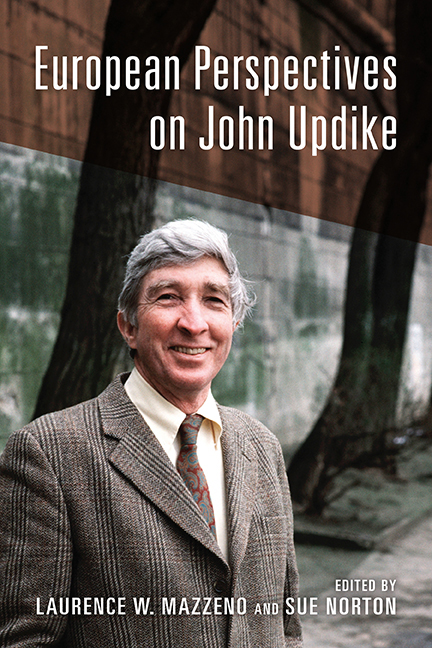Book contents
- Frontmatter
- Contents
- Acknowledgments
- List of Abbreviations
- Introduction: Updike as Europeans See Him
- Part I Coming of Age, Aging in Time
- 1 Under His Skin: Reconstructing the Adolescent Longings of a Would-Be Terrorist
- 2 “At the other end of life's rainbow”: Rabbit's Journey from Adolescence to Old Age and Other Transcendental Trajectories
- 3 Intimations of Mortality: Death's Shadow in Updike's Oeuvre
- Part II Love, American Style
- Part III Amazing Grace, American Faith
- Part IV Old World Myths, New World News
- Sources for Further Study
- Notes on the Contributors
- Index
3 - Intimations of Mortality: Death's Shadow in Updike's Oeuvre
from Part I - Coming of Age, Aging in Time
Published online by Cambridge University Press: 15 August 2018
- Frontmatter
- Contents
- Acknowledgments
- List of Abbreviations
- Introduction: Updike as Europeans See Him
- Part I Coming of Age, Aging in Time
- 1 Under His Skin: Reconstructing the Adolescent Longings of a Would-Be Terrorist
- 2 “At the other end of life's rainbow”: Rabbit's Journey from Adolescence to Old Age and Other Transcendental Trajectories
- 3 Intimations of Mortality: Death's Shadow in Updike's Oeuvre
- Part II Love, American Style
- Part III Amazing Grace, American Faith
- Part IV Old World Myths, New World News
- Sources for Further Study
- Notes on the Contributors
- Index
Summary
Life is a shabby subterfuge while death is real, and dark, and huge.
—John Updike, “Requiem”IN HIS MOVING TRIBUTE to Updike, U and I, a strange metacritical, antemortem eulogy prompted by the death of a fellow writer, Donald Barthelme, Nicholson Baker (1991) writes:
All I wanted, all I counted on, was Updike's immortality, his openended stream of books, reviews, even poems…. He was, I felt, the model of the twentieth-century American man of letters: for him to die would be my generation's personal connection with literature to die…. “I should,” I typed that morning, “write some appreciation” of Updike. And “it has to be done while he is alive.” (13)
Later in the book, Baker gets to the gist of what he is undertaking: “Memory criticism, understood as a form of commentary that relies entirely on what has survived in a reader's mind … is possibly a new and useful way of discussing literature” (88).
The notion of “memory criticism” may sound heretical or at least unorthodox in academia, but Baker here touches on a profound truth that has to do with the perennity of the writer—his “ticket to immortality” (Baker, 143), as Updike himself puts it. Though Baker had the foresight to write his tribute some eighteen years before Updike's death, our own lament as readers may best be given voice by Martin Amis's (2009) response in the Guardian to the news of Updike's death in 2009: “Several times a day you turn to him, as you will now to his ghost, and say to yourself, ‘How would Updike have done it?’ This is a very cold day for literature.”
As the first decade of our orphanage as readers and, perhaps, as writers is coming to a close, homage to Updike can perhaps find its natural locus in the more haunting images in his work, in particular those images that reveal a pentimento of death, despite his celebrated “yea-saying.” Diverging from the familiar readings in Updike critical studies that have tended to foreground the life-affirming, salvation-oriented aspects of his work (for example, Burchard 1971), this essay seeks to map Updike's journey into night and to sound the grief that, like a basso continuo, accompanies author and readers alike up to, in Henry James's (1909) phrase, “the point where the death comes in” (317).
- Type
- Chapter
- Information
- European Perspectives on John Updike , pp. 45 - 54Publisher: Boydell & BrewerPrint publication year: 2018



